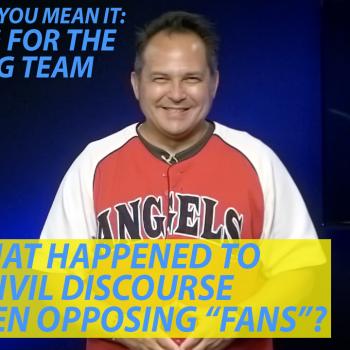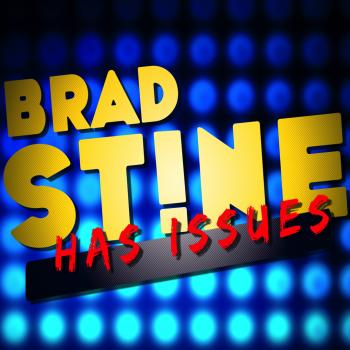
The evaluation of a vigorous debate continues between a Classical and a Presuppositional apologist.
William Lane Craig analyzes a debate between classical and presuppositional apologetics by Eric Hernandez and Sye Ten Bruggencate
 Reasonable Faith Podcast: The Debate on Apologetic Methodology, Part 2 Play Now | Play in Popup | Download
Reasonable Faith Podcast: The Debate on Apologetic Methodology, Part 2 Play Now | Play in Popup | DownloadWelcome back to Reasonable Faith with Dr. William Lane Craig. Let’s get into part two of this debate between classical and presuppositional apologetics. Eric Hernandez and Sye Ten Bruggencate were invited to dialogue on this on a Houston-area radio show. Eric is a classical apologist who agrees more with Dr. Craig than he would Sye Ten Bruggencate’s approach that is characterized as a more presuppositional method.
By the way, we made a connection here. After we recorded this podcast, we discovered that Eric actually asked Dr. Craig a question – a couple of questions in fact – at an apologetics conference in Texas not long ago. Eric brought the house down when he asked Dr. Craig this classic question:
ERIC HERNANDEZ: In knowing how to engage with atheists and knowing how to point out logical fallacies, what is the appropriate way to argue with your spouse without having given into that temptation of pointing out logical fallacies or ad hominems but really trying to communicate? I’m asking for a friend, not for me.
KEVIN HARRIS: So there you go! The answer to that is the topic of another podcast, but let’s just say that Dr. Craig and the panel basically affirmed that in marital relationships, or any personal relationships, you will want to stay out of debate mode and make sure your spouse is heard. He or she often does not want you to fix it or come up with some brilliant solution; they just want you to listen. We would do well to be quiet sometimes and listen.
Let’s pick up where we left off last week. Sye Ten Bruggencate continues in this exchange:
SYE TEN BRUGGENCATE: If somebody sees evidences and says why Christianity can’t be true then it shows that they were always the judge of the evidence. And I say that’s problematic. But I think my main issue with the other types of apologetics is it reduces God to probability. It does not talk about the God that has certainly revealed himself in Scripture. I think it ultimately reduces or takes away from Jesus Christ’s glory and salvation because these are things that you need to do to try and bring people into the fold. What I’m trying to do is give them the truth, not so that they’ll repent. 2 Timothy 2:24 and 25 says that in the hope that God will grant them repentance leading to a knowledge of the truth. So the people that I give truth to – it’s not so that they’ll repent. I gave truth to them in the hope that the Holy Spirit opens their eyes so that they have truth to be converted unto.
 DR. WILLIAM LANE CRAIG: Let’s interrupt at this point. This is exactly the same thing the evidentialist would do. He would present evidence and arguments in the hope that the Holy Spirit would use them to open the heart of the unbeliever and lead him to repent. I think it is actually unloving and uncaring to withhold good evidence from an unbeliever and just command him to repent without giving him any good reason to, especially if those reasons exist. Why would you withhold them?
DR. WILLIAM LANE CRAIG: Let’s interrupt at this point. This is exactly the same thing the evidentialist would do. He would present evidence and arguments in the hope that the Holy Spirit would use them to open the heart of the unbeliever and lead him to repent. I think it is actually unloving and uncaring to withhold good evidence from an unbeliever and just command him to repent without giving him any good reason to, especially if those reasons exist. Why would you withhold them?
SYE TEN BRUGGENCATE: And I think that’s the big difference in the apologetics – a different view of God. It’s a different view of Jesus. That’s what I found when I was using evidence to try to convince people that God exists. I was actually not honoring the Lord that I adore. Thankfully with this methodology I think that anybody can do it. It’s just a matter of starting with the presupposition that he exists and that his Word is true.
KEVIN HARRIS: Here is the first response from Eric.
ERIC HERNANDEZ: . . . that thinks I wouldn’t talk to anybody unless he thought that something he said would be effective. So I think right there he’s assuming that they at least have the free will to listen to him when he’s talking about presupposition apologetics. So, yeah, I think even he presupposes that the atheist is capable of understanding his reasoning, his logic. Whenever we do present arguments or evidences we’re not putting God on trial. We’re putting the atheist and his claims on trial because whether or not they believe in God is completely irrelevant to whether or not God exists. So, yes, I think that when you present things to the atheist about God, as the verse says how can they believe if no one’s told them? How can they come to God if they haven’t even heard of God and no one preaches to them? So, yeah, I definitely think that the atheist could understand and step outside of his worldview and say, Okay let me think about what you just said and set my beliefs aside and consider or weigh out the pros and cons of what you just said. No one else can be the judge of the evidence for himself but him. I can’t believe in God for him. He has to do that himself.
DR. CRAIG: That’s a good response but it does leave out what I would have wanted to emphasize, namely that it is the Holy Spirit who is using the arguments and evidence you present as means to draw that person to himself. There is just no reason to think that the Holy Spirit confines his work to preaching and doesn’t use other means of working. While what Hernandez has said is entirely correct, it is incomplete. I think he needs to emphasize the way in which the Holy Spirit is the one who brings about conversion and repentance by using means.
KEVIN HARRIS: This is the moderator of this debate. He is a pastor in the Houston area who has this radio show. He presents this question:
MODERATOR: Let’s just say the kalam cosmological argument – which I think anybody getting into apologetics is going to run across pretty quickly; it’s pretty easy to understand and it basically gets you to the sense that there is a cause behind the universe and all that we see or anything that begins to exist. Would you say that it’s a kind of an affront to God to even offer something like that as proof that God exists to a non-believer?
SYE TEN BRUGGENCATE: I would say it would depend on the context. However, even William Lane Craig admits that it is not arguing for the God of Christianity. And my Bible tells me there’s no other gods. So if it’s not arguing for the God of Christianity it’s arguing for something that I don’t believe in.
DR. CRAIG: Yeah, that’s, I think, really silly. Doesn’t he believe in the God of the Old Testament? And the kalamcosmological argument leads to a creator God of the universe. I think this is the God of Christianity, but that would require additional argument based upon Jesus, for example.
MODERATOR: Eric, I wanted to ask you then about this cumulative approach which someone like William Lane Craig, I think, would embody. Right? I mean, like you say, let’s say he’s arguing with an atheist. He’ll make five arguments for the case that God exists – the kalam, the argument for morality, the resurrection of Jesus. There’s usually another two in there that he uses frequently. Do you think the cumulative approach then is . . . I mean obviously you think you would say it’s a valid approach because you’re arguing for kind of a big-picture God and you’re going to whittle your way down to the God of the Bible.
ERIC HERNANDEZ: Right.
MODERATOR: Okay. What would you say are the benefits of that? Sye would argue, or a presuppositionalist would argue, that you’re already sort of talking about a God other than the God of the Bible and you’re already ceding ground to the non-believer.
ERIC HERNANDEZ: Well, first of all I’d say that some arguments like the kalam is used to get at certain attributes of God. Let me put it to you like this. If you look biblically, the Bible didn’t start off with the list of every attribute of God. It didn’t say God is a Trinity, God’s this, God’s that. In fact there is progressive revelation in Scripture so I don’t see why I cannot start with an argument that doesn’t conclusively lead to the God of the Bible. If the Bible itself doesn’t start with giving you every single attribute that God has – in fact, you find in the Bible where God says, come let us reason. Now, is God putting himself on trial? No, of course not. He’s respecting us as beings that reflect his mind and has given us minds that reflect his image and he expects us to use those. So, no, not at all. We can give arguments and then get there. There’s even books of the Bible that don’t explicitly teach on God. Now because they don’t explicitly teach on God does that mean they’re not canon? Of course not. So we can give arguments that point to certain attributes of God because in just the way epistemology works (which is a study of knowledge) we have epistemic chains. I don’t start with one belief unless I believe other things first. So before I can even perhaps believe in a Trinitarian God, first I have to believe that there’s more to reality than matter and the naturalism approach. So, yeah, there’s steps. Maybe later on we can talk about how people come to beliefs because you can’t simply believe something by forcing yourself to believe it. You can’t just say, Okay I’m going to force myself to believe something. You have to expose yourself to evidence, to knowledge, and to facts which is exactly what faith is – it’s a confidence based on knowledge.
DR. CRAIG: I like Andy Steiger’s definition of what faith is. Faith is trusting in that which you have good reason to believe is true. Faith and knowledge are not opposed to each other, nor is faith opposed to argument and evidence.
KEVIN HARRIS: He makes a good point about Genesis 1 doesn’t spell out every attribute. That would do a lot of work for us.
DR. CRAIG: No, it doesn’t. It says in the beginning God created the heavens and the Earth. It doesn’t say anything about Jesus Christ obviously. It is not the Christian God in the full sense of that term. We later discover it is the Christian God, but I would say the same thing about the kalamcosmological argument. You later discover this is the Christian God.
KEVIN HARRIS: Here is more of the exchange.
MODERATOR: . . . but you’re assuming too much – I think that would be the common critique of presup. You are assuming first of all that God exists, and you’re assuming that the Bible is the Word of God. But aren’t those the very things that the unbeliever doesn’t assume? So it seems to me that the classical apologist then is going to say, Okay, I’m not going to assume anything at all. I’m going to assume there’s kind of a neutral playing field where we can both go because we both, for example, have reason and then I’m going to argue for this God. Why isn’t it the case – or is it the case – that presuppositionalists assume . . . you assume God exists, you assume the Bible is real . . . why isn’t that though assuming too much if you’re actually trying to engage with a real non-believer?
SYE TEN BRUGGENCATE: Romans 11:36 says, from Him, through Him, and to Him are all things. All things include logic. They include science. They include morality. All things are from God. If I approach an unbeliever and I try and argue with him about evidences then I’m granting him things that belong to God. I’m granting him logic. I’m granting him morality. I’m granting him knowledge. All these things cannot be justified without God. So I’m saying, Here – these belong to Jesus Christ but I’m going to give them to you. I won’t do that. I will not use the tools of Jesus Christ to allow the unbeliever to argue against the Lord that I adore. I say if you’re going to argue about evidences, I’m not going to grant you those things. I’ll be happy to talk about evidences with you, but first what I want you to do is I want you to justify apart from God. You see because the Bible says everyone knows for certain that God exists. I believe the Bible when it says that. If I go up to an unbeliever and I say, Do you believe in God? and they say, No, and I believe them then first of all I am denying what Scripture says and I’m calling God a liar.
KEVIN HARRIS: So we are back to the “everyone believes in God and I am just going to somehow beat it out of you.”
DR. CRAIG: I wonder whether this Ten Bruggencate really believes in presuppositional apologetics or whether he just believes in preaching. Everything he said so far to me just sounds like an abandonment of the apologetics project – that you just preach to the unbeliever.
KEVIN HARRIS: That’s what he does.
DR. CRAIG: You just declare this is the truth. That’s fine for preaching. But that is not apologetics. The minute you construe this as some sort of argument then you are arguing in a circle. You are just begging the question. You are saying God exists therefore God exists, which is not glorifying to God. That is just bad reasoning.
ERIC HERNANDEZ: Let’s looks biblically. You see that when Elijah was talking with the prophets of Baal, he didn’t give them presup apologetics. He said, You build an altar. I’ll build mine. And whoever God lights it on fire is the real God. So there is an evidence there being presented for the existence of which God is the real God. I’m not sure what he means by logic belongs to God and that we can’t use them, that we give them to the atheist. Again, God gave us a mind that reflects his and our mind should reflect him. So to even say that perhaps . . . maybe he can clarify later but . . . basically, for example, existence also belongs to God, but existence belongs to me, too. I own the property of existing. So just because God is the ontological grounds for something doesn’t in no way mean that I can’t use it especially if he’s the one that gave it to me. To even say that logic belongs to God was something that is a conclusion that was drawn from logic and reasoning. So, yeah, as far as using evidence or arguments to convert, well let’s pretend I was an atheist and I just heard everything Sye said and I said, That was a great argument. He is absolutely right. I am now going to become a Christian or change my view of apologetics based on Sye’s argument. Well if Sye said that we didn’t use evidence and arguments to persuade or convert then what happens when someone becomes persuaded or converted based on a presup argument? It would seem self-defeating there.
KEVIN HARRIS: That makes a good point. Here is my argument and evidence that we don’t need argument and evidence.
DR. CRAIG: Yeah, it is very strange. I just find this sort of dialogue to be really bizarre and frankly unfruitful. I think Hernandez emphasized this. Ten Bruggencate seems to confuse having ontological derivation with somehow a guideline to apologetic method. Because everything derives from God (such as existence, logic, moral values) – because everything is ontologically derived from God – that this somehow dictates how you should reason with people. I don’t see any reason to think that that provides the guideline to apologetics method. Of course everything derives from God. That is not in dispute. But the question is: how do you effectively present a case for the truth of the Christian faith?
KEVIN HARRIS: There are a couple more segments here. You come back up, so let’s finish up the podcast with these two.
SYE TEN BRUGGENCATE: I would say they can’t be converted by my argumentation. If they’re converted it is because God has granted them repentance. Now as far as handing it over to the person . . .
DR. CRAIG: Let’s stop there. Again, this is the point that I was making earlier. To say that they are converted by his argumentation, what we want to say is that God can use the argumentation to convert the person. He consistently thinks of presenting argument and evidence as doing something that is either in competition with the Holy Spirit or is apart from the Holy Spirit. That is not at all what Hernandez is talking about. He is talking about giving arguments and evidence in the power of the Holy Spirit and trusting God to use those as means to convert or change the person’s mind.
SYE TEN BRUGGENCATE: I’m really happy when evidentialists bring up the story with Elijah and the prophets of Baal because they say, We’re going to show with evidence which God is God. So they make this altar. They cut up this bull. And the prophets of Baal are calling down fire and nothing’s happening and they end up cutting themselves and he says, Where’s your God? Is he on the toilet? That’s what he basically said. That’s a euphemism for “is he away?” or “is he busy?” And of course nothing happens. Then Elijah says, Douse this with water. And he douses it with water and calls on fire and it consumes the whole thing. They say, Wow! You’ve convinced me with evidences that your God is God. And Elijah says, I sure have. There’s our circumcision tent. I want you to line up single file. Now that you’re believers, we’re going to welcome you into the community. Welcome, aboard. Is that what Elijah did? No, he slaughtered them. Why? Because the evidence that was given was not to convince them that God exists; it was judgment for their unbelief. I say, look, if William Lane Craig wins a debate, that’s fine. He just has gotta kill his opponent.
DR. CRAIG: Oh. Gosh.
KEVIN HARRIS: Oh, Bill!
DR. CRAIG: I don’t even know how to respond to that. That is just . . .
SYE TEN BRUGGENCATE: . . . and a lot of presuppositionalists get it wrong. Instead of arguing six hours about the complexity of the eye, they’re arguing six hours about epistemology. Which is foolish. The Bible calls the unbeliever fools. And that is not in an intellectual sense. It’s in their willful ignorance of the God that they know exists. So instead of arguing evidence, like I say, we argue epistemology for six hours. How ridiculous is that? We have to honor Jesus Christ as Lord when we talk to them, and not give up the things that belong to Jesus Christ when we discuss his existence.
KEVIN HARRIS: I think, if I can gather from what you said, there is a difference here. Sye Ten Bruggencate is more interested in preaching and then whatever happens happens kind of a thing.
DR. CRAIG: Yeah.
KEVIN HARRIS: Like somehow something mystical is going to happen.
DR. CRAIG: And sometimes it does! God uses preaching. You read the book of Acts and look at the example of the apostles and Jesus himself, they weren’t at all afraid to present arguments and evidence for the truth of the message they proclaimed. They trusted the Holy Spirit to use that to bring people to him. They most certainly did not slay their converts when they converted! I just find these arguments that he is giving to be utterly unpersuasive.
KEVIN HARRIS: They get into certainty a little bit later in the debate. Sye Ten Bruggencate again brings you up. In response to Krauss, he said, Are you certain that God exists?, and you said, No. He said we should have absolute certainty. Eric Hernandez says, If you were to talk to Dr. Craig about that, he would explain to you what he means. Let’s leave him out of that and get back to the debate. But do you want to talk a little bit about certainty and when it comes to certainty doing apologetics like with Krauss on stage?
DR. CRAIG: Certainty, I think, is a will-o-the-wisp that is quite irrelevant to faith in Christ. It is not necessary in order to have faith in Christ. Jesus accepted the man who came to him and said, Lord, I believe. Help my unbelief.Certainly rational arguments and evidence are not going to deliver certainty. What they will deliver will be a degree of probability so that the rational man will follow the evidence where it leads and believe in God. I see absolutely no reason to think that simply preaching the Gospel is going to lead to a greater degree of certainty than that. In fact, you and I know that the testimony of young people raised in Bible-preaching churches is often that they are ridden with doubts because though they’ve heard the Word of God preached they have doubts about it and they don’t know how to answer them and there is no one to answer their questions. So I don’t see any reason to think that the presuppositional approach delivers greater certainty or psychological confidence in the truth of the Gospel than the arguments and evidence do. In fact, on the contrary, I think sometimes it could actually lead to grave doubts about the truth of the Christian faith.
Where I think there would be greater certainty available would be through the witness of the Holy Spirit. Remember I said that the fundamental way that we know our faith to be true is not through argument and evidence, but through the ministry of the Holy Spirit. For someone who is filled with the Holy Spirit, walking in the Spirit, living a sinless life, in communion with God – he may have very high certainty that his Christian faith is true. But that will be based upon an experience of the Holy Spirit, not upon arguments and evidence for the truth of Christianity.
KEVIN HARRIS: One of the things that Sye Ten Bruggencate says – I’ve heard him say it a lot in this debate as well – that one of the problems of evidentialism and using any kind of a classical or evidential approach in apologetics is if evidence can persuade you to come to Christ then evidence can persuade you away from Christ. You are vulnerable if it is merely evidence.
DR. CRAIG:That might be true for the pure evidentialist. But, you see, if you accept this distinction that Hernandez has made between knowing your faith to be true and showing your faith to be true then that is not the case. Arguments and evidence are part of showing your faith to be true. If those arguments and evidence collapse, that just means you don’t have an effective way of showing someone that what you know to be true is true. When we talk about evidentialism in this context we are talking about an apologetic method. I am not an evidentialist if you are talking about religious epistemology. I agree with Alvin Plantinga that the fundamental way in which we know the great truths of the Gospel is through the immediate witness of the Holy Spirit. But arguments and evidence are useful for showing someone else that what we know to be true is true.
KEVIN HARRIS: So would you characterize your approach more as classical?
DR. CRAIG: That is what I have characterized it as. Steven Cowan edited a book a few years ago called Five Views on Apologetics, and he put me under what he called the classical model of apologetics. I accepted that so long as one understands it in terms of what I just said – that we are not dependent upon arguments and evidence for knowing Christianity to be true. But when we want to show someone that it is true then if you are to avoid begging the question and reasoning in a circle then you have to use good arguments and evidence that will appeal to commonly accepted truths that you and the unbeliever share.
(This podcast is by Reasonable Faith / William Lane Craig. Discovered by Christian Podcast Central and our community — copyright is owned by the publisher, not Christian Podcast Central, and audio is streamed directly from their servers.)












